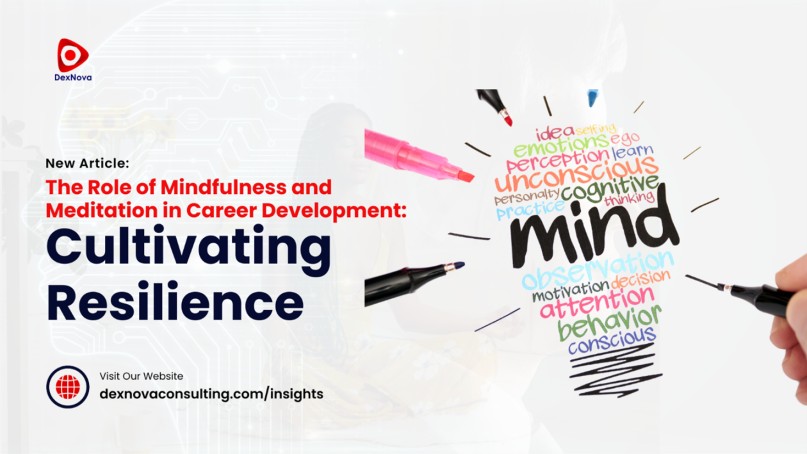The Role of Mindfulness and Meditation in Career Development: Cultivating Resilience
- November 7, 2023
- Posted by: dexnovaconsulting
- Category: Articles

The Role of Mindfulness and Meditation in Career Development: Cultivating Resilience
Introduction
In the fast-paced and often demanding world of career development, cultivating resilience has become a critical skill for professionals. The ability to bounce back from setbacks, adapt to change, and maintain a sense of well-being is not only beneficial for personal growth but also essential for success in the workplace. Mindfulness and meditation are powerful tools to help individuals build and strengthen their resilience, ultimately enhancing their career prospects. In this article, we will explore the role of mindfulness and meditation in career development and how they can help us cultivate resilience.
Understanding Resilience
Resilience is the capacity to recover from difficult experiences and adapt to change in a way that leads to personal growth. It is not about avoiding adversity but instead how we respond to it. Resilient individuals are better equipped to navigate challenges, handle stress, and maintain their focus and composure in the face of uncertainty. In a career context, resilience can mean the difference between success and burnout, between achieving your goals and giving up when faced with obstacles.
Some of the critical benefits of resilience in the workplace include:
- Improved mental and emotional well-being.
- Enhanced ability to manage stress and avoid burnout.
- Increased adaptability and flexibility in the face of change
- Greater capacity for problem-solving and decision-making
- Strengthened relationships and collaboration within the team.

The Connection Between Mindfulness and Resilience
Mindfulness is a mental practice that involves being fully present and aware of your thoughts, emotions, and sensations in the present moment without judgment.
Some of the key ways mindfulness fosters resilience include:
- Improving self-awareness and self-regulation can assist individuals in better managing their emotions and responding to situations.
- Reducing ruminating and overthinking, which can lead to stress and anxiety.
- Improving focus and attention which can lead to better problem-solving and decision-making abilities.
- Encourage individuals to perceive problems as opportunities for learning and growth by promoting a growth mindset.
Meditation is a structured form of mindfulness that can help individuals develop this skill. Both mindfulness and meditation play a significant role in enhancing resilience for several reasons:
- Stress Reduction: Mindfulness and meditation practices are proven stress-reduction techniques. When we are mindful, we can identify and manage stress more effectively. By being present and aware of our reactions, we can avoid being overwhelmed by stressful situations and maintain a clear mind.
- Emotional Regulation: Resilience requires the ability to manage and regulate one’s emotions effectively. Mindfulness and meditation help us develop emotional intelligence by allowing us to observe our emotions without judgment. This helps us understand our reactions and make more conscious choices in challenging situations.
- Cognitive Flexibility: Resilient individuals are more adaptable and open to change. Mindfulness and meditation encourage cognitive flexibility, enabling us to see situations from different perspectives and make more informed decisions when facing challenges in our career development.
- Enhanced Focus and Concentration: Mindfulness practices improve our ability to stay focused and maintain concentration. This is invaluable in a fast-paced work environment where distractions are abundant. A clear, focused mind allows us to navigate our careers efficiently and effectively.
- Self-awareness: Understanding oneself is a fundamental aspect of resilience. Mindfulness and meditation promote self-awareness, which, in turn, helps us recognize our strengths, weaknesses, and values. This self-awareness is critical to setting and achieving meaningful career goals.
Cultivating Resilience Through Mindfulness and Meditation
- Daily Practice: Incorporating mindfulness and meditation into your daily routine is essential for building resilience. Allocate time each day to engage in these practices, even if it’s just for a few minutes. Consistency is critical to reaping the benefits.
- Stress Management: When faced with stress, pause. Breathe deeply and observe your thoughts and emotions. This simple practice can help you respond to stress more calmly and effectively.
- Emotional Awareness: Regular meditation can help you develop emotional intelligence. Recognize your emotional responses and their impact on your decisions. With practice, you can make more conscious choices about how to react in challenging situations.
- Mindful Decision-Making: In your career, it’s crucial to make well-informed decisions. Mindfulness can help you think through choices more clearly and consider the potential consequences, leading to better decision-making.
- Resilience in the Face of Setbacks: When confronted with setbacks or failures, use mindfulness and meditation to process your emotions and reflect on the lessons learned. Resilience doesn’t mean avoiding failures; it means learning and growing from them.
Conclusion
In the world of career development, cultivating resilience is a valuable asset. Mindfulness and meditation can significantly contribute to your ability to bounce back from setbacks, adapt to change, and maintain well-being in the face of challenges. By incorporating these practices into your daily life, you can build the resilience to thrive in your career, navigate obstacles, and achieve your goals. The journey toward career success is not without its hurdles. Still, with mindfulness and meditation as your tools, you can cultivate the resilience to conquer them and continue growing personally and professionally.
